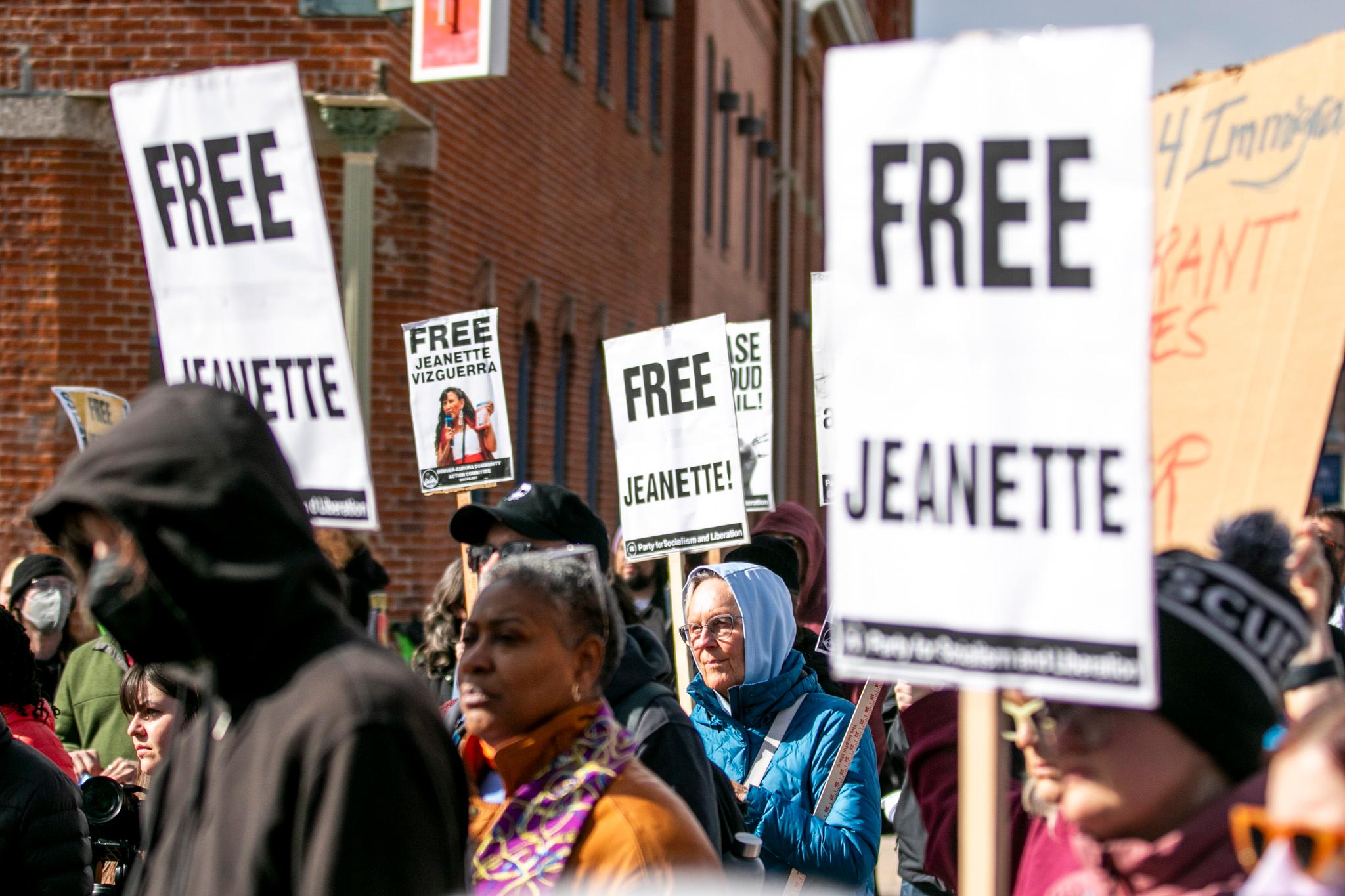In a tactical shift, attorneys for Jeanette Vizguerra are now arguing that she is being unfairly targeted for deportation by government agents frustrated by their inability to remove her from the U.S. during a 15-year process.
The new approach by attorney Laura Lichter, filed Thursday, caused the cancellation of a Friday court hearing designed to determine whether Vizguerra could continue to be held by the government for deportation.
Instead, U.S. District Judge Nina Y. Wang convened a status conference and gave the government three weeks to respond to Lichter’s forthcoming new argument that pursuit of Vizguerra is rooted in their frustration with her criticism over the years of Immigrations and Customs Enforcement.
“As the court is aware, this case has been moving very quickly and there have been material changes, some additional facts, that we determined after we filed our initial petition,” said Lichter. “One of those centers around our concern that Ms. Vizguerra’s detention was retaliatory for her exercise of her first amendment speech rights.”
“She was ambushed in the Target parking lot by officers from Immigration and Customs Enforcement who said ‘we finally got you.’”
Such an argument may not ultimately protect Vizguerra from deportation, but it adds a new wrinkle to a case that has played out for more than a decade through immigration courts and the news media.
And, at least for now, it means she will remain held in the ICE detention facility in Aurora.
The government asked for 21 days to respond to the yet-to-be-filed amended petition, noting that the court has already put a stay on any deportation until federal court proceedings run their course. Which the judge said could push a hearing on the matter to late next month, depending on when the amended petition is filed with the court.
Vizguerra has multiple federal court cases in process — including the one heard Friday. While her attorneys challenge her detention in federal district court, they’re also disputing the validity of the deportation order against her in the 10th Circuit Court of Appeals. They argue the government never properly served her with a deportation order and failed to fully inform her of her right to appeal.
Federal agents detained Vizguerra on March 17 — less than two months after President Donald Trump returned to office — while she was working at a Target store in the Denver area. Her attorneys filed a habeas petition the next day, contesting her detention.
Vizguerra rose to national prominence in 2017, when she evaded immigration authorities by living in a church basement early in the first Trump administration. Her public defiance drew widespread attention, making her a symbol for both immigration activists and hardliners.

She came to Colorado from Mexico in 1997 and worked her way up from cleaning offices to organizing for the janitor’s union. In 2009, a routine traffic stop launched what has become a 15-year battle to stay in the U.S. Federal authorities initiated deportation proceedings, and while she appealed, Vizguerra traveled briefly to Mexico in 2012 to visit her dying mother. She later pleaded guilty to illegal reentry.
After serving one year of unsupervised probation, Vizguerra successfully applied for stays of deportation five times. But when Trump first took office in 2017, ICE denied her sixth request. She sought sanctuary in the First Unitarian Church in Denver’s Capitol Hill neighborhood.
Time Magazine named her one of the 100 most influential people of the year in 2017. Her cause was championed by Colorado lawmakers, including then-Congressman Jared Polis, who said she was being unfairly targeted. Soon after, she received a two-year stay of deportation and left the church.
It was a short-lived reprieve. In 2019, when her stay was not renewed, she again sought sanctuary in the church. By 2020, amid the pandemic, protests over the killing of George Floyd, and a turbulent election year, Vizguerra quietly left the church once more.
Like many immigrants with uncertain status, Vizguerra kept a low profile — working at Target and raising her U.S.-citizen children — until Trump was reelected last year. His administration again moved to deport her shortly after his inauguration.
Vizguerra’s national profile has helped her secure extraordinary legal resources. Many of the hundreds of cases that go through immigration court in Colorado every year are rarely afforded more than limited pro bono help. Often people going through immigration court don’t have an attorney, and are confused by the proceedings. Many are deported to their home countries with no fanfare, no press.

Vizguerra’s attorneys told the judge that they were “frustrated” by the immigration authorities trying to proceed with so-called “reasonable fear” interviews with Vizguerra. It’s a normal part of the process, triggered by previous deportation orders.
“I sent an email yesterday to the Houston asylum office reiterating my concerns about representation and they’re not communicating directly with my client unless I was present, and asking them to hold the review in abeyance pending the result of this litigation,” said Lichter.
The judge didn’t rule on that issue, but noted that Vizguerra has the right to have council present at the interview. The judge also ordered the case to be unrestricted, so that the filings are publicly posted online going forward.












